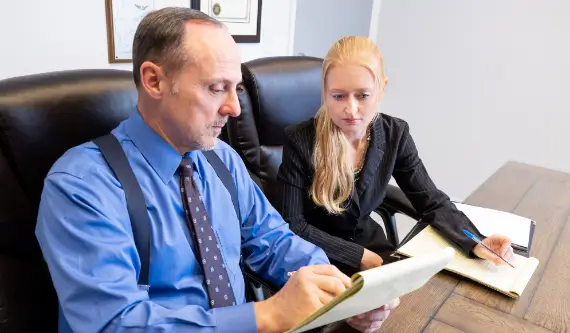Fort Myers Criminal Defense Lawyers

Committed to Excellence in Criminal Defense in Southwest Florida
At Foley & Wilson Law Firm, we bring over 45 years of legal expertise to the forefront of criminal defense. Our firm is led by a distinguished legal team: Robert Foley, a retired FBI Special Agent and former state prosecutor, alongside Desiree Wilson, an experienced former federal prosecutor and appellate attorney. Together, they spearhead a practice that is not just professional but deeply committed to treating each client with the dignity and respect they deserve while protecting their rights and working to secure the most favorable outcome in even the most dire circumstances. Being arrested in Florida can be stressful and intimidating, but with the right team on your side, the situation can often be managed successfully in your favor. Contact our experienced Fort Myers criminal defense lawyers today.
A Comprehensive Florida Criminal Defense Law Practice
We understand the gravity of facing criminal charges and the impact they can have on your life. Our firm is adept in handling the full range of Florida criminal legal matters, ensuring you receive skilled representation tailored to your unique situation.
Burglary, Theft, and Vandalism
Facing allegations of burglary, theft, or vandalism can lead to severe legal consequences. Our experienced attorneys can help protect your rights and craft a robust defense strategy.
Domestic Violence
Allegations of domestic violence carry not just legal, but also social ramifications. Our team is skilled at navigating these sensitive cases with the care and discretion they deserve.
Drug Crimes
From possession to trafficking, drug-related charges demand a nuanced legal approach. Persons accused of drug crimes in Fort Myers benefit greatly from our expertise in drug crime defense.
DUI
DUI charges can have long-lasting effects on your personal and professional life. We provide comprehensive legal support to challenge DUI allegations and achieve a positive result.
Gun Violations
Gun law violations require a deep understanding of both state and federal laws. Our team is well-versed in these complexities.
Injunctions
We offer experienced guidance in cases involving restraining orders and injunctions, ensuring your side is heard and respected.
Juvenile Crimes
Juvenile offenses can impact a young person’s future significantly. We provide a skilled and knowledgeable defense that seeks to protect their future opportunities.
Resisting Arrest
Resisting arrest charges can complicate any legal situation. Our firm can help mitigate these charges with a strategic defense.
Seal/Expunge Criminal Records
We assist in sealing or expunging criminal records whenever available, helping you move forward without the burden of a past conviction.
Sex Crimes
Facing sex crime allegations can be devastating. Our defense strategies are designed to protect your reputation and legal rights.
Violation of Probation
Violations can result in severe penalties. We provide experienced counsel to navigate these complex situations.
Violent Crimes
Violent crime charges require a defense that is both aggressive and tactful. Our team brings both qualities to your case.
White Collar Crimes
We provide sophisticated defense strategies for those accused of white-collar crimes, understanding the nuances of these complex allegations.
Expertise in Federal Criminal Defense
Our expertise extends to defending clients against federal charges, which require a different strategic approach given their complexity and severity. With experience as a federal prosecutor and a federal agent, we know federal prosecutions from the inside out, enabling us to tailor a defense that anticipates prosecutorial tactics and provides a smart, strategic defense.
Federal Drug Crimes
We offer seasoned defense against federal drug crime allegations, understanding the higher stakes involved in federal court.
Federal Gun Crimes
Navigating federal gun laws demands specialized knowledge, which our team possesses in abundance.
Federal Sex Crimes
Federal sex crime charges carry harsh penalties. Our firm provides a defense that understands the intricacies of federal law.
Federal Drug Trafficking
We defend clients against federal drug trafficking charges, focusing on reducing or dismissing these serious allegations.
Federal Conspiracy
Our team is adept at dismantling federal conspiracy charges and understanding the detailed investigation this requires.
Federal Cybercrimes
In the digital age, cybercrime defense requires a firm with cutting-edge legal knowledge. We are that firm.
Federal Mail & Wire Fraud
Mail and wire fraud charges demand a comprehensive legal strategy, which we provide with expertise.
Federal Tax Fraud
Our team is skilled in handling the complexities of federal tax fraud cases, protecting your rights throughout the process.
Contact Us Today for Seasoned and Effective Help With Criminal Defense in Fort Myers
At Foley & Wilson Law Firm, we are a boutique Federal and State criminal defense law practice with a highly credentialled legal team possessing the knowledge, skill and ability gained from over 45 years of experience in the criminal justice system. We’ve seen and handled it all. Whatever the allegations are against you, we will provide you with the best, and highest-level professional representation. It’s what you deserve and need. We are your lawyers, not your judges. Anyone can find themselves in a bad situation and it’s our responsibility to treat you and your loved ones with dignity and respect during a very traumatic time. We ask for the same level of respect in return from our clients. We will not represent gang members, habitual felony offenders or prison repeat reoffenders. Serious allegations require a serious team of lawyers, and a serious defense. That is who we are.
We understand the anxiety and uncertainty that comes with criminal charges. That’s why we offer a free initial consultation to discuss your case and let you know how we can help. Our services are available in both English and Spanish to better serve our community. Contact us today to take the first step toward a skilled, compassionate defense.



















